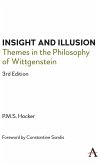The first two parts of Objectivity and Insight explore the prospects for objectivity on the standard ontological conception, and find that they are not good. In Part I, under the heading of subject-driven scepticism, Sacks addresses the problem of securing epistemic reach that extends beyond subjective content. In so doing, he considers models of mind proposed by Locke, Hume, Kant, James, and Bergson. Part II, under the heading of world-driven scepticism, discusses the scope for universality of normative structure-a problem which survives even after the assumption of an epistemologically significant breach between subject and object has been rejected. In the third part of the book Sacks introduces an alternative conception of objectivity, and shows that there is good reason to accept it. This conception turns on an insight which is taken to be implicit in transcendental idealism, and responsible for its abiding appeal; but Sacks's articulation of that insight is neither idealist nor metaphysical.








